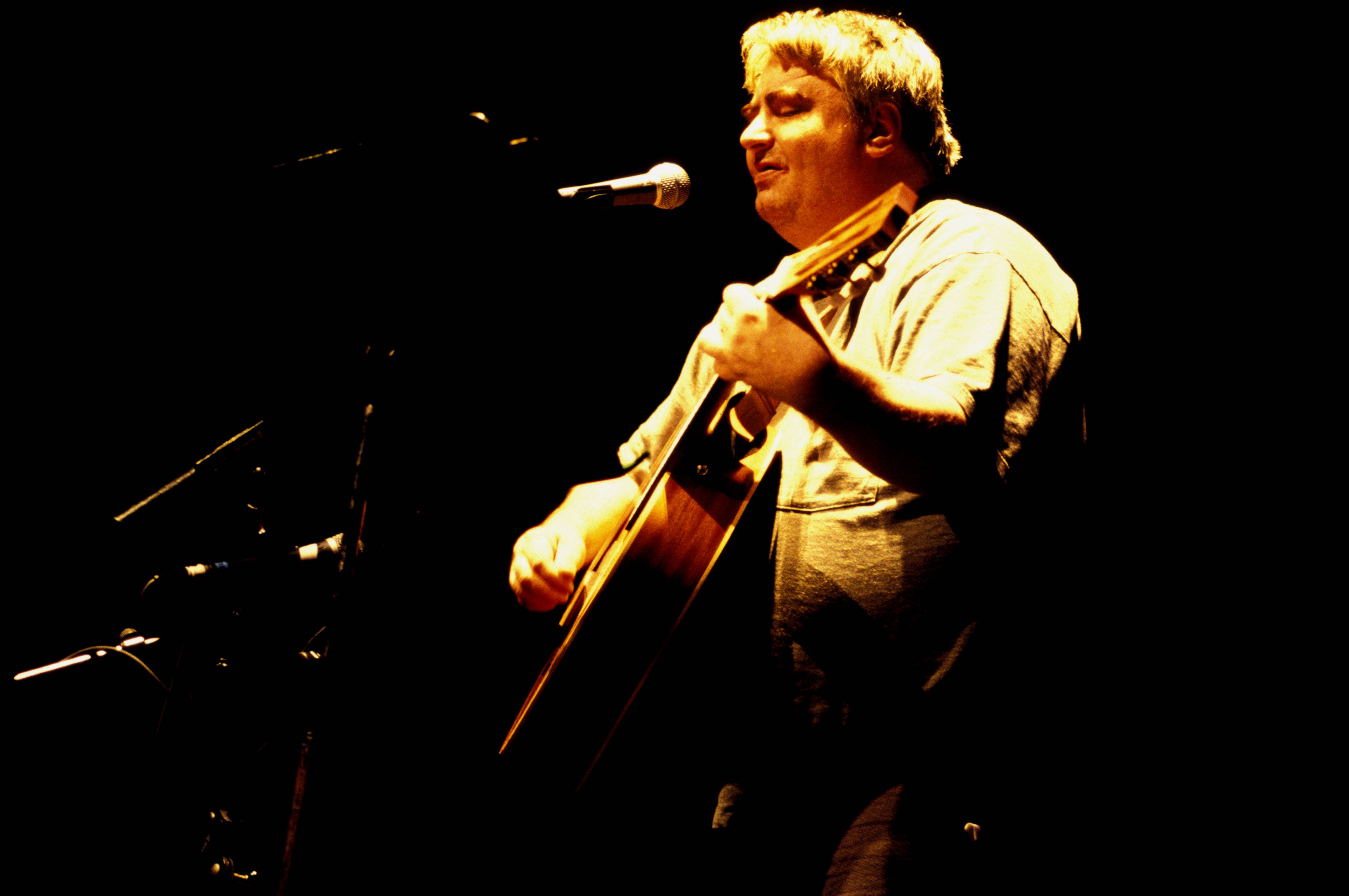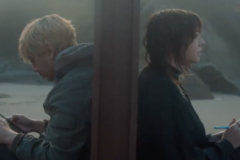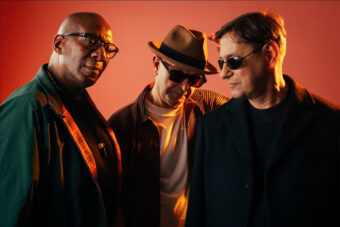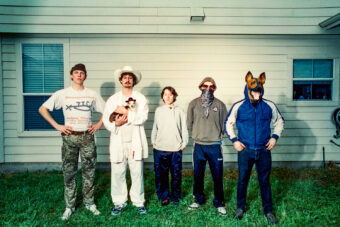This story originally appeared in SPIN’s March 1989 issue. In Johnston’s memory, we’ve digitized and republished it below.
Jeff Tartakov went to visit Daniel Johnston at the Austin State Hospital just before Christmas, 1986. It was the first time Johnston had been committed, and the social worker in charge of the case was relieved to see Tartakov, Johnston’s friend and manager. Here was a patient they knew nothing about: possibly schizophrenic, possibly manic depressive, definitely psychotic. And the worst part was that he seemed to be suffering two terrible delusions. The first was that on Christmas day the military would take over the country. The second was that he had to get out of the hospital soon because the next Sunday he was scheduled to appear on MTV. The social worker turned to Tarkatov for help. Tarkatov hesitated and said he didn’t know about the first, but the second was true.
Drove the demons
Out of my head
With an organ and
A pencil full of lead
And when I’m dead
I’d like to have it said
“He drove the demons out of his head”
I’m a loner, I’m a sorry entertainer
—“Sorry Entertainer”
This is a strange mythology, one that includes demons and Casper the Friendly Ghost, a boxer named Joe and King Kong. It is the story of a strange songwriter, a lonely entertainer, who wandered the streets of Austin, Texas, handing out free tapes and introducing himself, “Hi, I’m Daniel Johnston.” Befriended, adopted by bands like the Butthole Surfers and Sonic Youth, Johnston has had his songs covered by underground musicians from Mike Watt of fIREHOSE to Reivers to the Wild Seeds to the Dead Milkmen. David Byrne claims him as a favorite. Several of his homegrown cassettes, recorded on a $59 Sanyo ghetto-blaster on the cheapest tape available, will come out on record this year because of deep enthusiasm and support. He has spent the last three years being discovered, being recorded, being praised, appearing on MTV and checking in and out of mental hospitals. Last summer he went off medication, attacked a woman and caused her to fall from the window of her apartment, breaking several bones. He is now hospitalized by court order.
You can listen to these songs
Have a good time and walk away
But for me it’s not that easy
I have to live these songs forever
—“Peek-A-Boo”
***
October, 1988.
SPIN: Where are you?
DANIEL JOHNSTON: I’m at Weston Mental Hospital in Weston, West Virginia. My home state of West Virginia.
And how long are you there for?
I don’t really know, but I’ve been here for two months.
And why are you there?
I, ahh, I attempted to, ahh, cast out, I cast out this lady’s demons. She jumped out a window.
To save herself from having her demons cast out?
She didn’t do it while I was around, and the door on the inside of her house was busted in from the inside out.
Did you do that?
Can I do that? I didn’t do it, the demon did.
So as you were casting out her demons she jumped out a window?
The demons jumped through the door and she jumped out the window. I was already on my way out. I was watching back and I didn’t see it happen.
***
Johnston recently sent Jeff Tartakov a tape from the Weston Mental Hospital. It said, “This is a message from Daniel Dale Johnston, would-be artist, cartoonist, singer, songwriter. Here with a few ideas to talk about different things I’d like to do.
“First, we ought to make a commercial with Mountain Dew. I’d like to do a commercial for Mountain Dew.”
When I was out in San Marcos
A year ago today
They probably would have put me in a home
But I threw all my belongings
Into a garbage bag
And out into the worldness I did roam
—”Broken Dreams”
Born in Sacramento, California, in 1961, the youngest of five children, Johnston and his family soon moved to New Cumberland, West Virginia, where his father, an engineer who had been a member of the Flying Tigers in World War II and later worked on Minuteman missiles, landed a job with Quaker State. Growing up, Daniel was into art as much as music, and into music a lot: Lennon, Ono, Dylan, Neil Young, David Bromberg, Sex Pistols, the Beatles. “It was really wild in West Virginia,” he says, “because all we had was records. When I was 19 I wanted to be the Beatles. I was disappointed when I found out I couldn’t sing.”
Johnston and his friends began to record their own tapes and trade them among themselves. He continued making his crude tapes when, after high school, he went to a branch of Kent State near his family’s home. This was probably the most productive period of his life. Unemployed, sporadically attending classes, he began to spend most of his time in the cellar of his family’s house, writing and recording songs, just him with his guitar or piano. Among the tapes he made in that cellar were Songs of Pain and More Songs of Pain, both largely about his unrequited love for a woman who ended up marrying an undertaker.
After two and a half years in the art program, he was ready to leave Kent State. On the advice of someone from Marvel Comics, he moved to Texas, because he wanted to be an artist, and anyway in 1983 there weren’t many jobs in West Virginia. First he went to Houston, where he lived with his brother and worked at AstroWorld on the River of No Return ride. Though he stayed in Houston for less than a year, he recorded the Yip lump Music and Hi, How Are You? tapes there. He moved to San Marcos where, after coming close to a nervous breakdown, he joined a traveling carnival show.
Johnston told writer Chris Walters that the carny revitalized him. “It was like a movie all the time. Everybody around me was a great story that never stopped, and for the first time, I realized how much freedom you have to do what you want, how you could live going from place to place. It was dangerous, too, but it got me writing again. I had a little portable tape recorder that I took with me, and I wrote all the time.”
After five months on the road with the carny he ended up in Austin and decided to stay. He started passing out tapes and introducing himself—to everyone. One Saturday he came by the office of The Austin Chronicle, where I worked. Instead of knocking, he stood outside the door making noise, shuffling, until finally I heard the sounds and opened the door. Shyly he handed me a tape. He seemed innocent, but with a sense of just how to use that innocence. The tape box bore a strangely drawn creature on the cover and the disclaimer, “This album was recorded not under the influence of drugs.” I accepted it, promised to consider it for review and went back to work. A minute later, I heard him shuffling outside again and returned to the door. He told me that he didn’t want the tape reviewed. He’d given it to me as a gift.
His tapes—lo-fi home recordings, out of tune, out of time, but mesmerizing—began to generate a lot of interest among local musicians and music writers. One night at a bar he told someone, “I’ve been critically acclaimed.” Then, pointing to a local writer, he said, “And there’s the critic that acclaimed me.”
***
The opening band had finished 15 minutes ago, and the Beach, a former convenience store that all too often betrayed its origins, was noisy, smoky, and crowded. Glass Eye, one of the more popular and adventurous Austin bands, was due up shortly. Around the room, an impressive number of local musicians and writers stood quiet, poised, waiting.
Without fanfare or introduction, Daniel Johnston took the stage for the first time, obviously nervous, scruffy, with the air of a Roky Erickson 22 years young. Holding an acoustic guitar, he stepped up to the microphone and rushed into his first song. The musicians and writers, who’d been waiting to hear him, some for months, leaned forward. Against a hard current of crowd chatter, his voice was on the point of quavering, his playing beyond inexperienced: long pauses between isolated chords, betraying more practice at being a rock star than playing guitar. He paused and hit another chord.
The room grew quiet. Someone asked, “Who is this?,” and was quickly hushed. Some weren’t sure if they were watching a joke or not.
And no one knows who they are
They come from afar
They do what they have to do
And turn into big stars
And no one can stop them
The marching guitars
—“Marching Guitars”
It was a song haunted by itself, a Fleischeresque cartoon vision of stardom that, long lusted after, ultimately needs to be destroyed. In Johnston’s amateurish delivery, it was a dire prophecy. With this set, which lasted three songs, Daniel Johnston had more or less arrived.
He got a job at McDonald’s, sweeping the floor, clearing tables, and introducing himself to every customer. Although he continued to hand out his tapes for free, they were also on sale at several record stores, and became local best sellers. A handful of other Austin bands—including Glass Eye, the Wild Seeds, True Believers, Reivers, Rhythm Rats and Texas Instruments—began covering his songs. Then MTV’s “Cutting Edge” program came to town, and everybody they asked told them they should have Daniel Johnston on the show. So they did.
Although McDonald’s had been on the verge of firing him, after the “Cutting Edge” show aired, his hours increased. MTV, record companies and journalists began calling him at work, because it was the only phone to which he had regular access. As his reputation spread, the Dead Milkmen recorded his song, “Rocket Ship,” and Sonic Youth and Mike Watt of fIREHOSE made plans to record some of his material. The Butthole Surfers and other Austin bands started to work on a compilation album of his songs.
Then just before Christmas, 1986, I got a phone call: Daniel was standing in a flooded creek on the University of Texas campus, talking about God and the devil, singing about water, speaking of sin. For maybe an hour, three of us stood in drizzling rain at the side of the creek, listening to him singing, trying to talk him out. But he was too far gone even to know we were there. Finally the police showed up, and said that if we didn’t go in after him, they would. We plunged into the waist-deep water and dragged him out.
It was the end of a month of psychological decline. After a hiatus, he was once again smoking marijuana, or “happy smokes,” and he seemed to be high a lot of the time. There’d been a bad acid experience at a Butthole Surfers concert and a trip to Abilene, Texas, to visit his brothers and sisters, who put him on a bus back to Austin because he was scaring the nieces and nephews. Later he talked about staring out the bus window and seeing all these cow skulls and realizing they were the mark of the devil, and that Texas was the devil’s state. When he got back to Austin, he recognized the devil in one of his associates and tried to beat him out with a pipe. After the morning in the creek, I helped get Daniel committed for the first time. He spent that Christmas in the hospital.
I visited him often. As the days passed he became more lucid, and with lucidity, he became demanding. Daniel loved to make demands. It was as if he’d yearned his whole life for this little bit of stardom, and now he was going to live it for all it was worth.
He gave everyone who visited a long list of things to say and do in his name on the outside: people to call, demands to make. He began to plan his career again, to dream his dreams—wildly vacillating dreams that swung from self-deprecation to the claim that of course he was as good as Dylan. And, as always, he was writing. Following a court hearing he was released. At first he seemed better, but then he began to crack again. He destroyed all his master tapes and many of his drawings. He lost control. His friends began to talk about maybe having him recommitted. I used to read about mad artists whose friends put them in mental hospitals and wondered how anybody could be so insensitive, so self-serving, so blind to genius. Now, it seemed the only way to stop him from hurting himself or someone else. As efforts were being made to recommit him, Tartakov called Daniel’s father, who piloted a small plane down to Austin. He stayed about two weeks, until Daniel was stable enough to travel, and then father and son returned home to West Virginia.
It was a long recovery period. We heard that all he did all day was sleep and eat, that he was get-ting fat. He now said he would never write or per-form again and wanted Tartakov to stop working on his career. He also said he had lost his soul to the devil, and that music was the devil’s work. He claims he only wrote one song that year.
I was living in a devil town
Didn’t know it was a devil town
Oh lord it really brings me down
About the devil town
And all my friends were vampires
Didn’t know they were vampires
Turns out I was a vampire myself
In the devil town
—“Devil Town”
Then slowly he started returning to normal. He began to talk again with Tartakov about his career. His renown as a songwriter continued to grow even while he was sick. More and more bands became interested in his songs. In January 1988, Daniel even started taking some college classes. He lasted only until April, though, when he decided to go north to check out the NoiseNY studio, run by Kramer, a former member of Shockabilly and the Butthole Surfers who had become a New York institution for recording and producing independent music. Sonic Youth drummer Steve Shelley put him up. Again fantasy merged with reality for him, as he found himself taken up by the New York music scene. Blast First, Sonic Youth’s label, contracted to release Hi, How Are You? on vinyl.
But New York overstimulated Daniel, and when he stopped taking his medication, things began to fall apart. As was his habit, he made a number of long distance calls on credit and borrowed money to buy records. He became more manic, insisting that his manager set up meetings with everybody from David Byrne to Yoko Ono
At a benefit for the Village Voice writer’s union, he created a minor scene. When his performance stretched beyond his allotted time limit, the club DI cut him off, putting on a record in the middle of one of his songs. Daniel froze and began screaming, then stood silently, refusing to leave the stage. Lee Renaldo of Sonic Youth reached into the DJ booth and lifted the needle, and Johnston played another song.
He scheduled a series of in-store shows in Hoboken, New Jersey, but the first proved not to be a performance at all; it was more like he was preaching, calling the devil with a voice wounded by God. After the gig, the record store backed out of any more appearances. On the way home and afterward, he threatened and attacked Steve Shelley.
As a result he moved out. After the fight, he ended up living on the street or staying in a shelter for the homeless. Half mad, half rational, he was sure everything was going his way and that he was going to conquer New York City. He called Tartakov daily, firing him again and again; he also called me daily, and who knows whom else, placing person-to-person calls from Abraham Lincoln, Jonathan Demme, Jesus Christ.
He called Blast First so many times—often to tell them about deals he was making with other record companies—that they told him they would only release his record on three conditions: that he rehire Tartakov, that he go home, and that he stop calling them. He didn’t. In the end, 24 hours before they were scheduled to press the record, and with thousands of sleeves already printed, they scrapped the deal. They weren’t going to work with him. “Because they met me,” he says.
Still he continued to record in New York, going into the studio with Moe Tucker, original drummer of the Velvet Underground, and Jad Fair of Half Japanese. He sings backup on her version of “Pale Blue Eyes.” As does Lou Reed—to avoid an encounter the day Reed recorded his part, Daniel was taken to the Statue of Liberty, where he was promptly arrested for scrawling anti-Satanist graffiti. A few days later, after a scuffle on the street, he was committed to Bellevue, but released a day later. That night he did a two-song set at CBGB, opening for fIREHOSE. Finally, after disrupting, upsetting, and aggravating—as well as stimulating—as much of the city’s avant-garde rock community as he could, he went home to West Virginia.
Went home crazy and possessed, convinced he’d lost his soul to the devil and was searching for God. His parents committed him. He sent letters to everyone, charging conspiracy. Once again, back on medication, he gradually became lucid again. After several months he was released and, following a rest at home, he went to Maryland to visit Jad Fair and record some songs. The material he cut there, all made up on the spot, is terrific, as strong as any of his material.
After a week in Maryland he visited some friends near his home. He stopped taking medication, and ended up walking around all night, into the morning. The details of what happened next aren’t all clear—he’s told the story different ways to different people, each of whom takes his own version as gospel. But he saw a woman and thought she was the devil, broke into her apartment and attacked her. As she was backing away from him she fell out a window, breaking several bones. She lived. He’s in the hospital now, calming down, getting better.
In an appropriate irony, since he has been committed, Homestead records has released Hi, How Are You? to substantial critical attention and college radio airplay. Daniel always did figure he was smarter than the rest of us, and that things would work out the way he wanted them to. We talked the other day. I asked him, “How is your soul?” “Well you know I did lose my soul to the devil,” he said, “but I’m happy to say I was redeemed by Casper the Friendly Ghost. As a matter of fact I am Casper the Friendly Ghost.”
He was smiling through his own personal hell
Lost his last dime in a wishing well
But he was hoping too close and then he fell
Now he’s Casper the Friendly Ghost
—“Casper the Friendly Ghost”
Daniel Johnston was scheduled to be furloughed from the Weston Mental Hospital in December, but he attacked another patient, and his stay has been extended. Both Homestead and 50 Skidillion will be releasing his music on album throughout this year.





